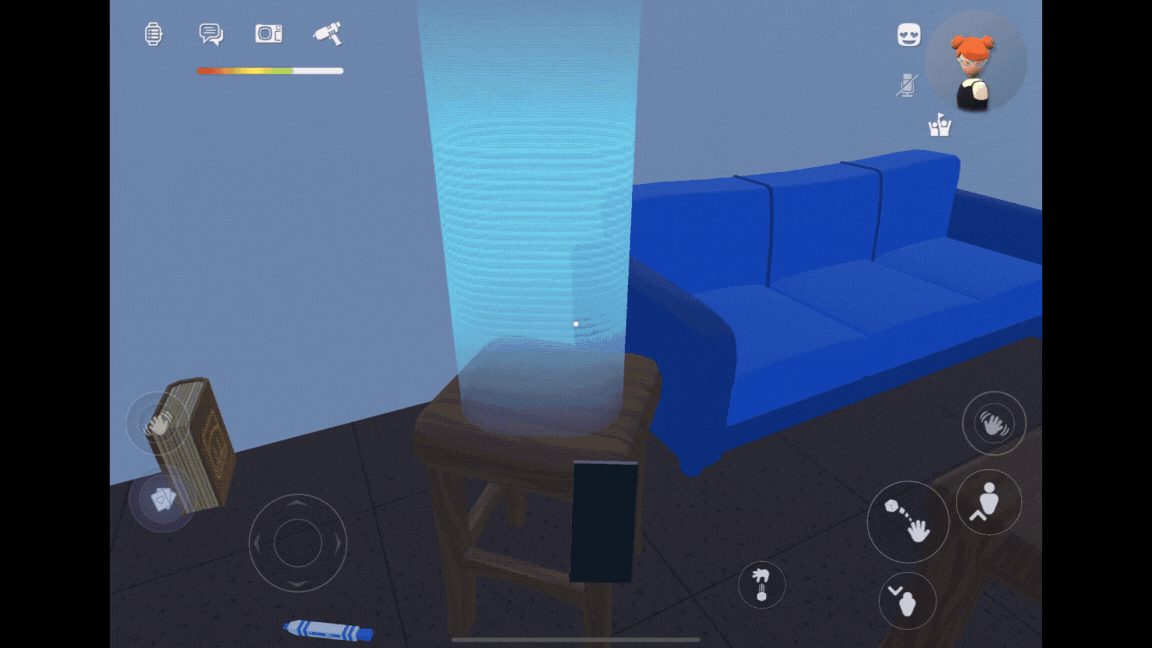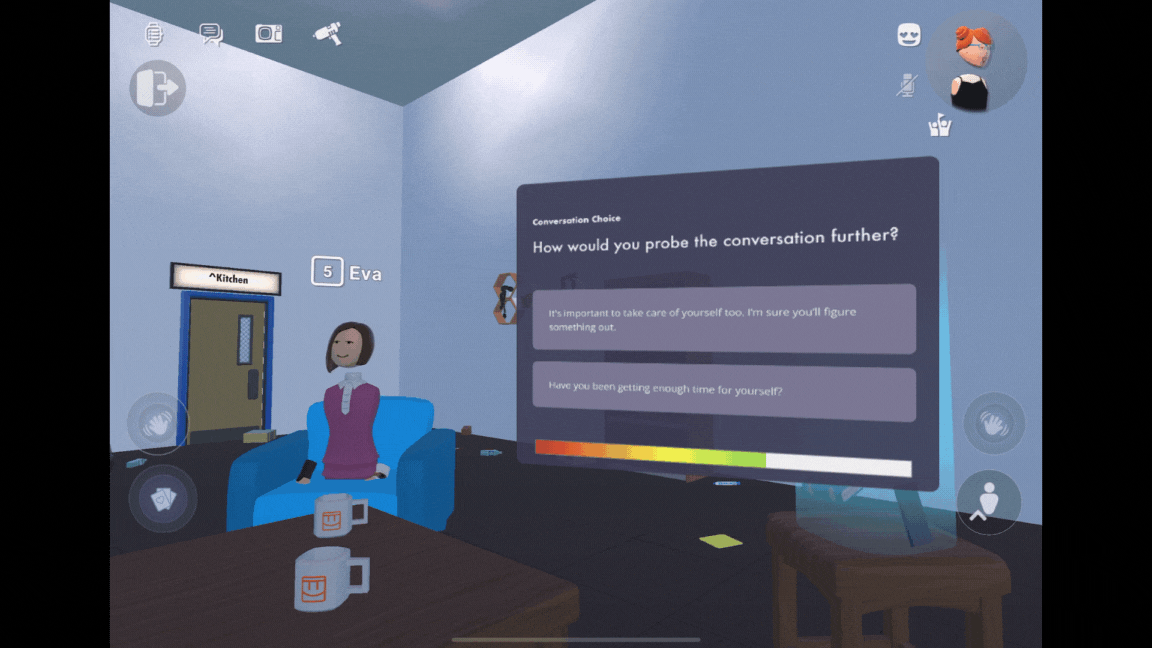
Empathy Quest
UX RESEARCH • PRODUCT DESIGN • GAME DESIGN
Educational VR game to help family and friends of the birthing parent detect Perinatal Mood and Anxiety Disorders (PMAD) at an early stage
Overview
Empathy Quest is an innovative UX Research project that uses virtual reality (VR) to educate the support system of new parents about Perinatal Mood and Anxiety Disorders (PMAD). Through an immersive and interactive decision-based game, it aims to increase awareness, empower users to identify PMAD signs and provide actionable support. The project bridges the knowledge gap and strives to prevent the negative consequences of untreated PMAD, fostering a supportive environment for new parents.
Client
Eli Lilly
Duration
08 Months
Role
UX Researcher and Product Designer
Key Contributions
-
Research Planning
-
UX Research
-
Analysis
-
Ideation
-
Co-creation
-
Story Writing
-
Game Design
-
Prototyping
Client Expectations
.png)
PMAD Problem Space
Identify design opportunities to support new moms facing PMAD or similar disorders, focusing on their specific needs and challenges.

Exploration of VR Solutions
Explore VR solutions specifically within the context of PMAD, to determine how they can be effectively used for educational, diagnostic, & treatment interventions

Proof-of-Concept
Develop a tangible proof-of-concept that demonstrates the potential usability and effectiveness of the VR solution for addressing PMAD
What are Perinatal Mood and Anxiety Disorders (PMADs)?
A spectrum of mental health disorders experienced by parents during pregnancy and in the postpartum period. These can manifest in a variety of forms such as anxiety, depression, OCD, PTSD, or even psychosis in extreme cases.
1/5 WOMEN & 1/10 MEN
experience depression or anxiety during perinatal period
ONLY 25%
are identified and receive treatment
80% WOMEN
experience "baby blues"
BABY BLUES > 2 WEEKS
could indicate PMAD
Challenge
After the initial research and discovery of the problem space, we identified the following challenges that need to be rectified to provide a robust support system for birthing parents
AWARENESS AND EDUCATION
-
Lack of awareness and knowledge about Perinatal Mood and Anxiety Disorders (PMAD)
-
Ineffective resources for educating families about PMAD
EARLY DETECTION
-
Inability to detect PMAD symptoms at an early stage
SUPPORT & WELL-BEING
-
Difficulty in prioritizing the mental health of the birthing parent amidst the significant life shift experienced by both parents
-
Neglect of the birthing parent's health due to the focus on the new baby
-
Lack of understanding on providing support to birthing parents exhibiting PMAD symptoms
How might we design an engaging VR experience to
-
raise awareness about PMAD,
-
empower the support system of birthing parents,
-
enable early detection and proactive support for the well-being of the birthing parent and baby?
Solution
The solution combines immersive VR technology, educational content, decision-making scenarios, and practical resources to create an engaging and impactful experience. It aims to increase awareness, empathy, & effective support for birthing parents facing PMADs.

AWARENESS & EDUCATION • SUPPORT & WELLBEING
Immersive Educational VR Experience
-
VR engages users in an interactive learning journey, fostering empathy.
-
Develops understanding through experiential education.
-
Provides insights into the mother's perspective, fostering holistic well-being.
AWARENESS & EDUCATION
9 Steps of Wellness
-
The immersive experience educates users on the 9 steps of wellness and empowers users to assist birthing parents
-
Collectible totems provide detailed information about PMAD and actionable steps

EARLY DETECTION
Visual Cues and Decision-Making Scenarios
-
VR game integrates visual cues for identifying PMAD signs
-
Decision scenarios teach handling situations with empathy
-
Enhances users' ability to spot and address early symptoms

Design Process

Phase 1: Research
Before this project, I wasn't aware of PMAD or any type of perinatal disorder. During this phase, I immersed myself in understanding what PMAD looks and feels like, utilizing all opportunities to expand my domain knowledge, including attending PMAD-related conferences.
Environmental Analysis
-
Employed Strategyzer’s environmental analysis for holistic problem space understanding
-
Desk research insights guided user interview questions
User Interviews: PMAD affected moms and SME
Research Questions
-
How did they become aware of PMADs?
-
How does PMAD look and feel?
-
How is PMAD diagnosed and treated?
-
What support did they need v/s what did they receive?
Phase 2: Define
We collected extensive interview data and utilized diverse synthesis methods to uncover patterns, which helped us make data informed decisions.
Refining focus: addressing "education" & "friends of birthing parents"

Sam
Eva's (Mom) childhood best friend
Aspiration
“I know something is up with Eva but I don’t know how to help”
“Parenthood is difficult, I hope Eva and Archie are doing okay.”
Goals & Needs
-
Gain insight into Eva's experiences & offer meaningful support
-
Maintain consistent communication and monitor well-being
-
Provide practical assistance whenever necessary
Attitude & Behaviour
-
Genuine concern for Eva's well-being
-
Is sincerely interested in understanding PMADs
-
Takes proactive steps to provide meaningful and effective support
People closest to the mom, who understand her regular behavior, can accurately point out anomalous behaviors, so educating them is key
Key Insights
Educating family and friends
“...wish we had a more formal way of educating families about PMAD...
Close friends and family play a critical role in early detection and support, highlighting the need for standardized education about PMADs for families
Delayed diagnosis - significant hurdle
"...if people around a struggling mom knew what signs to look out for if mom's behavior is not as per normal, it could make a significant difference...
Lack of awareness among family and friends can lead to delayed PMAD diagnosis and increased suffering for the new birthing parent
Normalizing perinatal struggle
“...normalizing postpartum disorders can be very helpful Since most moms do not anticipate these disorders and when things get difficult they think something is wrong with them...
Normalizing PMADs and promoting seeking help can empower new birthing parents to acknowledge their struggles without stigma
Phase 3: Ideation
Collectively, my teammates and I brainstormed and generated over 30 ideas to address the challenges and utilized participatory design to bridge the gap in our knowledge, leading to a decision-based game inside an immersive experience.
Here are some sketches from my explorations and contribution to the team's initial pool of ideas:

Integrating the perspective of "friends of birthing parent" through participatory design
-
Conducted 3 participatory design sessions with friends and spouses of birthing parents.
-
Organized original 30 ideas into four categories
-
Categorization helped participants identify and prioritize the most desired area of intervention
Key Insights
-
Realistic language for communication was highlighted as essential for effective understanding
-
Knowing how to talk about the issues, emphasizing the importance of open and supportive discussion
-
A participant emphasized the significance of complimenting moms, acknowledging their appearance, and sacrifice
-
Giving free time to birthing parents by taking care of the baby emerged as a crucial aspect of support
-
Emphasized looking for red flags such as signs of desperation or feeling overwhelmed, & ensuring that birthing parents have time for themselves
Final Solution: Empathy Quest + Accountability Partner

Phase 4: Prototyping
Due to time constraints, we focused on prototyping Empathy Quest (Educate and Train) first, reserving the Accountability Partner (Support) for the next phase. This decision prioritizes education, with a decision-based game teaching players to identify PMAD signs and take empathetic actions.
Empathy Quest Narrative
Our team faced difficulty in reaching a consensus on the narrative of the game. To harmonize these perspectives, I orchestrated a collaborative story-writing session. Within three 15-minute rounds, we harmonized diverse ideas into a cohesive narrative, achieving consensus through collective effort.

We focused on a narrative segment highlighting how mothers often neglect themselves while prioritizing their babies, and how friends can provide crucial support in such situations while approaching with empathy

Want to read full narrative with dialogues?
Assembling the Prototype
The prototype development process encompassed three distinct segments.
My key contributions were to shape the gameplay environment and create a video that effectively communicated the concept and functionality of the prototype.

Let's take a look at Empathy Quest...
Learnings
Throughout my 8 month's involvement, I delved into an entirely new mental health area - PMADs. Consistent communication with our subject matter expert enhanced my understanding of the problem space, intensifying my empathy for parents navigating childbirth challenges. This project's revelations equipped me to offer meaningful support to my own circle.
Navigating Sensitive Topics
Dealing with a sensitive topic like PMADs required emotional resilience. My team and I learned how to maintain a healthy emotional distance while working on such topics, adopting practices to disengage when needed to ensure our mental well-being remained intact.
Seizing Opportunities
I consistently sought out opportunities to bridge gaps and enhance project dynamics. Notably, during the Labour of Love conference, I engaged with Birdie Meyer bringing her on board as our subject matter expert. This pivotal connection granted us access to the PSI components of the care workshop, directly influencing the development of our core idea to educate about the 9 steps of wellness.
Dynamic Decision-Making
During the project, my adaptability and flexibility were prominent as I guided the team through decision-making conflicts using multiple methods, ensuring effective resolutions and aligning strategies with evolving needs.
A big shoutout to...
-
Elizabeth Wertz - our medical mentor and subject matter expert. It's hard to imagine this project without her expertise and guidance. She was an integral part of our team, providing constant support and instrumental insights to ensure our work was both medically accurate and aligned with our goals. This project wouldn't have been the same without her expertise and feedback.
-
Birdie Meyer for supporting our project amid her tight schedule and giving us the opportunity to attend the PSI components of care
-
Professor Andrew Miller and Eli Lilly Partners (Malika Mahoui, Danielle Behrens, Tony Major), their encouragement and partnership have played a pivotal role in our journey. Your support has been a driving force behind our accomplishments.





